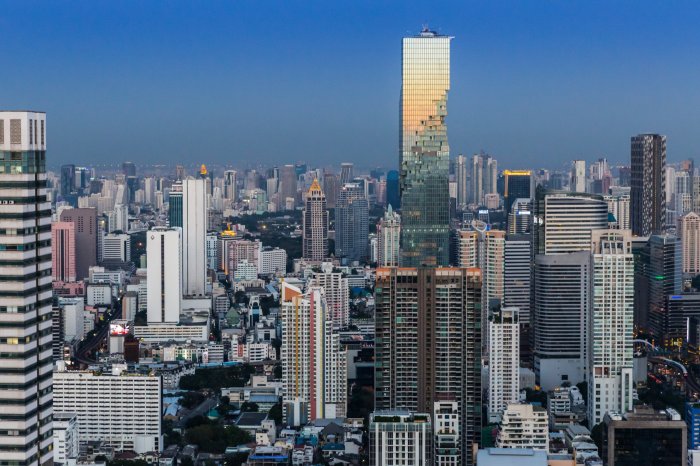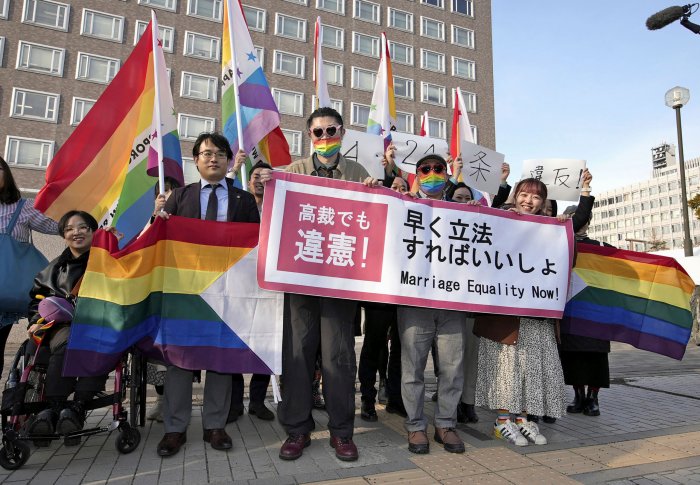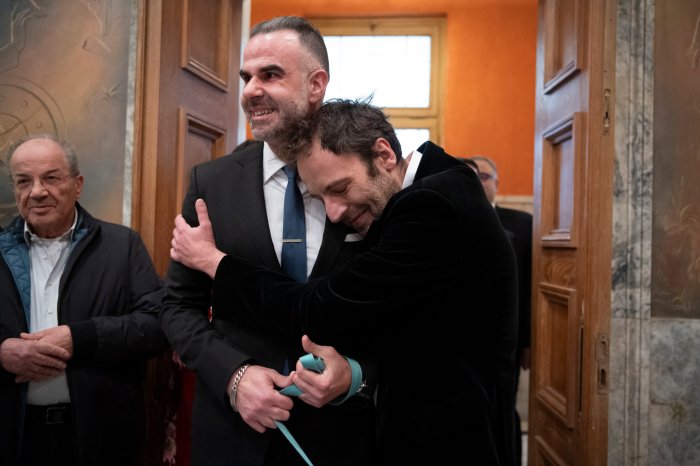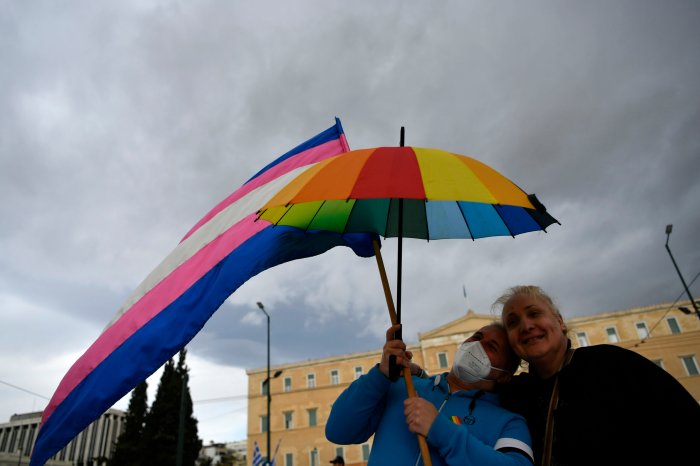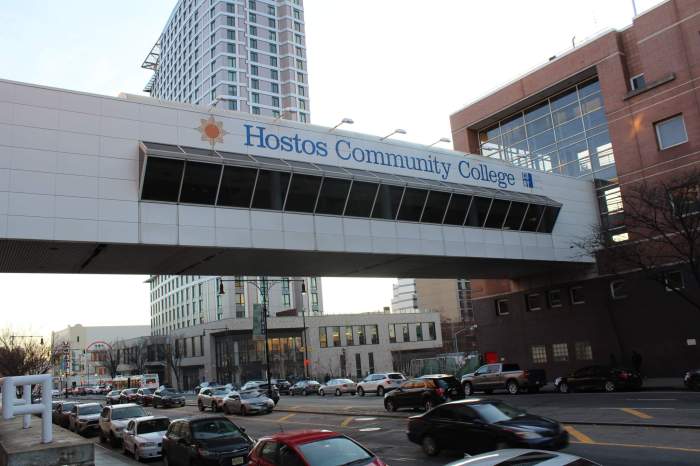BY DOUG IRELAND | In the latest acts of repression against Uganda's LGBT community, three gay activists were arrested on June 4 as they tried to draw attention to the need for HIV prevention among gay people during a peaceful protest at a major AIDS conference, co-sponsored by the Bush administration. The government of ultra-homophobic President Yoweri Museveni has consistently refused to include any focus on prevention among LGBT Ugandans in its response to the pandemic.
The trio – Julian Onziema, 28, a transgendered man, 27-year-old lesbian Valentine Kalende, and Usaam Mukwaya, a 28-year-old gay man – were part of a group of activists from the nation's leading gay rights coalition, Sexual Minorities Uganda (SMUG), whose protest came in response to a new round of anti-gay declarations from the head of the country's AIDS-fighting effort.
Activists arrested for highlighting Uganda's failure to do gay prevention
“Gays are one of the drivers of HIV in Uganda, but because of meager resources we cannot direct our programs at them at this time,” the chairman of the Uganda AIDS Commission, Dr. Kihumuro Apuuli, told reporters in the capital Kampala on June 2, according to Reuters.
“The remarks made by the head of the AIDS Commission were very disturbing to members of the LGBT community,” said Kasha Jacqueline, chair of Freedom and Roam Uganda, a lesbian organization, adding, “If they want us to die, let them ask themselves if they wish themselves the same. Excluding us is just going to make the situation worse.”
Uganda's health minister, Jim Muhwezi, recently said that his country's gays “don't deserve a special message” in the fight to prevent the spread of HIV. “They shouldn't exist, and we hope that they are not there.”
In March 2002, while accepting an award for his nation's HIV/AIDS prevention programs, Museveni said simply, “We don't have homosexuals in Uganda,” and on other occasions he has denounced gays as “worse than dogs.” Last year, Human Rights Watch noted, “For years, President Yoweri Museveni's government routinely threatens and vilifies lesbians and gays, and subjects sexual-rights activists to harassment.”
Police persecution of LGBT Ugandans is widespread, and courts can punish homosexual acts with a life sentence in prison. Even “attempted” homosexuality can draw a jail term of seven years.
AIDS workers in Uganda report that, because all government-sponsored HIV prevention materials, like billboards and leaflets, exclusively feature heterosexual couples, many gays in the underdeveloped and poorly educated country believe that AIDS is not a disease that can affect them and remain unaware the virus can be transmitted by unprotected sex.
A 20-year-old Kampala gay man named Joel recently told the African news website Afrolnews that, “Some boys believe that to sleep with a man is safe because all the billboards around town show heterosexual couples, with messages… Nothing is said about homosexual couples using a condom so they think it is safer to sleep with each other than with a girl.”
The three arrested and their fellow SMUG activists were distributing leaflets and press releases and holding up placards at the HIV Implementers' Meeting, an annual event co-sponsored by the Bush administration's President's Emergency Program for AIDS Relief (PEPFAR), as well as by UNAIDS, UNICEF, the World Bank, and the Global Fund to Fight AIDS, Tuberculosis and Malaria. The conference was held at a Kampala hotel.
After two days of detention, “all three were eventually released on bail, and face a court hearing on Friday,” June 20, David Kato, SMUG's crisis officer, told Gay City News by telephone from Kampala.
The SMUG protest and the arrests of its activists received widespread media attention, Kato said, adding that “the government newspaper New Vision denounced us for bringing unwanted attention to immorality from foreign media, saying, 'Uganda is now on TV only because of these bad people.'”
In the past two and a half years, LGBT Ugandans have been under increasing attack, by both leading government figures and the sensationalist media. A popular daily tabloid newspaper, Red Pepper, led outing campaigns in 2006 and 2007 in which it named more than 100 it said were gay or lesbian, printing descriptions of them, and describing their places of residence and employment. (For more on this, see this reporter's September 14-20, 2006 article “Uganda Witch Hunt Escalates” and his September 13-19, 2007 article “Uganda's Anti-Gay Stampede.”)
The gay-baiting media campaign forced many LGBT Ugandans out of their homes, SMUG's Kato told this reporter: “One guy was told by his landlord to move out because he was a criminal, and many others had to move away from their homes. Some of those who could left the country.”
SMUG co-founder Victor Juliet Mukasa, a transgendered lesbian, earlier this year joined the Africa staff of the International Gay and Lesbian Human Rights Commission (IGLHRC), which has offices in Cape Town, South Africa, after she fled Uganda in fear of her life. When police raided her home, seized documents, and manhandled and arrested a female friend of hers, Mukasa had the temerity to sue the police for an illegal action and took her case all the way to the nation's highest court. The lawsuit received significant media attention in the Ugandan press.
Mukasa, who has been on a ten-day visit to Uganda which began this past weekend, told Gay City News by telephone from Kampala, “We know our forefathers knew about homosexuality. It was in all the kingdoms of our forefathers. The homophobia was imported into our culture by colonialism and Christianity, which dehumanized and criminalized us. So we refuse the allegation that homosexuality is incompatible with Uganda's traditional culture, we don't believe it.”
Mukasa and other LGBT advocates, however, must fight the widespread practice in Uganda of calling homosexuality “the Western disease.”
Mukasa said that she has found that, as a result of her court case and the recent arrests of SMUG members, “more and more people are coming out, and our LGBT movement has grown. There is new leadership which has come up to replace us, and more and more people are turning up to ask, 'What can we do?'”
In previous years Uganda's LGBT community has been riven by factionalism between rival groups, but on this trip home, Mukasa said, “I've observed more unity than ever before, just an amazing amount of solidarity and people working together. It makes me proud and gives me hope for the future.”
In a related development, the UK government of Prime Minister Gordon Brown has refused asylum to a 26-year-old Ugandan lesbian, Prossy Kakooza, who was raped and severely burned in her homeland because of her sexual orientation but now faces deportation back to Uganda.
Kakooza had been forced into a marriage engagement but when her family discovered her relationship with her girlfriend, Leah, whom she met at her university, they marched both women, naked, two miles to a police station, where they were jailed. Kakooza was violently raped by Ugandan police officers who taunted her, saying, “We'll show you what you're missing” and “You're only this way because you haven't met a real man.”
Her family eventually bribed her out of prison, and decided they would sacrifice her instead, believing that “this would take the curse [of lesbianism] away from the family.” While the family was making preparations to slaughter her, she escaped and managed to make her way to Britain.
Despite the fact that forensic medical evidence found by UK doctors on Kakooza's body confirmed that she'd been raped and burned with hot skewers, the Home Office has refused her asylum request on the grounds that her injuries were “the random actions of individuals” and that, if returned to Uganda, she would be safe simply by moving to another town. But in Uganda, one cannot settle in a new town without a reference from one's previous village, and because she is now known to be a lesbian Kakooza would be subjected to similar persecution wherever she went.
Human rights and LGBT groups, pointing out that Kakooza could face life imprisonment if returned to Uganda under the country's anti-homosexual laws, are campaigning for messages to be sent to Liam Byrne, Minister of State for Borders and Immigration, demanding that Kakooza be granted immediate and permanent asylum in the UK.
Messages can be emailed to Byrne at privateoffice.external@homeoffice.gsi.gov.uk, faxed to 011-44-870-336-9034, or sent by post to Mr. Liam Byrne, Minister of State for Borders and Immigration, Home Office 3rd Floor, Peel Buildings , 2 Marsham St., London SW1 4DF England.
The Sexual Minorities Uganda (SMUG) web site is at http://www.sexualminoritiesuganda.org/aboutus.html. For more information on the case of Prossy Kakooza, go to http://www.mccmanchester.co.uk/prossy.htm. A videotape of Kakooza telling her own story is available on YouTube at http://www.youtube.com/v/H3doJs98PD0. Doug Ireland can be reached through his blog, DIRELAND, at http://direland.typepad.com/direland/.



























